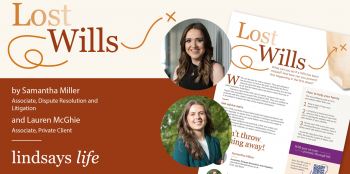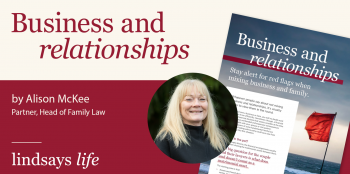Our family law team help many families on a weekly basis, and over the years have noticed a number of recurring beliefs that are regularly expressed. Here we look at the most common misconceptions that exist regarding family law in Scotland, and look at the reality of the situation.
1. "A common law wife has the same rights as a married wife”
There is no such thing in Scotland as a “common law wife”. A person is either married or not, there is no process whereby following a number of years living together, a “bidie in” transmutes into a spouse. Couples living together are cohabitants and do have some rights which are set out in the Family Law (Scotland) Act 2006. They are, however, not the same as those of spouses upon divorce in terms of the Family Law (Scotland) Act 1985.
2. “The woman automatically gets custody of the kids”
In Scotland, there are no such terms as “custody “ or “access”, those terms having been replaced by “residence” and “contact” by the Children (Scotland) Act 1995. When parents separate there is no requirement to have any orders granted in relation to children at all, unless it is necessary in cases where there is a genuine dispute. The court, when deciding on an issue such as residence, will make an order which is in the best interests of the child in the individual circumstances of that case, and if a Sheriff or Judge decides that it is better that a child stays with dad, then residence will be awarded to the father.
3. “Pensions are not matrimonial property”
A pension has a monetary value and is counted as part of a married couple’s matrimonial property in the same way that money invested in a bank account or stocks and shares are counted as matrimonial property. The pension has a value based on how much is held within the fund at the date of separation. A pension can be divided on divorce by way of a pension sharing order, and if such an order is implemented, a portion of one spouse’s pension is removed from his or her pension fund and placed into a pension fund nominated by the other spouse. As with all pensions, the sums are not actually paid out until retirement.
View more information on financial rights – separation and divorce
4. “Unmarried fathers have no rights”
It would be more helpful if parents thought of having responsibilities towards children rather than rights. Since 4th May 2006, unmarried fathers who sign the Register of Births have the same rights and responsibilities as the mother and this is in terms of the Family Law (Scotland) Act 2006. Mothers’ rights do not automatically trump those of fathers, although clearly in many cases where couples have separated, mothers have the practical advantage of having day to day care of a child. Unmarried fathers who signed the Register before 4th May 2006, or didn’t sign at all, can ask the mother to enter into a Parental Rights and Responsibilities Agreement, ask a court to grant such rights and responsibilities or marry the mother. If parties cannot agree on any aspect of child care, that dispute must be resolved by a court.
5. “Child maintenance stops when a child reaches 16 years”
Legally, a parent’s obligation to financially maintain a child lasts until that child is 25 years of age if the child is still in full time education or vocational training. However as many parents find, in reality the moral financial obligation lasts much longer! The duty is owed by both parents toward the child, so that a child over the age of 16 years who is away at college can seek maintenance from both parents. Generally when a child of separated parents lives at home, one parent fulfils the obligation to aliment by providing bed and board, the other parent makes payment of child maintenance.
6. “ A wife always gets alimony after divorce”
In Scotland, there is a “clean break” principal which is at the heart of financial settlements and monthly payments from income (termed “periodical allowance”) to an ex-spouse are only granted in very limited circumstances. Generally a spouse who needs additional financial support after divorce, such as to readjust to a lower income, will be granted an unequal share of the couple’s capital rather than monthly payments from the ex-spouse’s income. It was recognised many years ago that the old fashioned practice of forcing couples to remain financially tied following divorce caused distress and acrimony in many cases.
7. “You can’t commit adultery if you are separated”
If you are still married, then you are committing adultery, even if you have been separated for many years. The definition of adultery should not require explanation!
8. “If you get married in Scotland, you have to get divorced in Scotland”
In Scotland, in general you are divorced in your local court in the area in which you are habitually resident. It has nothing to do with where you married. You do not require to return to Nevada to be divorced if you ordinarily live in Methil but married at the Little White Chapel in Las Vegas.
9. “If a divorce is your fault, you will be punished for that financially”
There is only one ground of divorce in Scotland, namely that the marriage has broken down irretrievably. That breakdown is proved in various ways such as non-cohabitation for a period in excess of two years, or one year if your spouse consents, or unreasonable behaviour on the part of the other spouse, or adultery. A spouse’s behaviour even if unreasonable is only relevant to the financial settlement it can be shown to have impacted adversely on their finances. A serious gambling habit which frittered away the family fortune can fall into this category.
10. “ My wife and I separated a couple of years ago - she has now inherited a large sum from her late mother and I want half”
Money inherited or gifted from a third party is not matrimonial property. In addition any money or assets accumulated by a spouse after the date that parties separated is not matrimonial property. Therefore you will not be entitled to any of your mother-in–law’s estate! It should be noted that money that is inherited or gifted can however be converted into matrimonial property if received during a marriage and for instance, used to purchase a family car. In that event, upon divorce the money is not automatically reimbursed but account can be taken of the source of the funds when negotiating how a couple’s assets are to be divided.
If you would like to discuss any of the issues raised above, please contact a member of our family law team.








